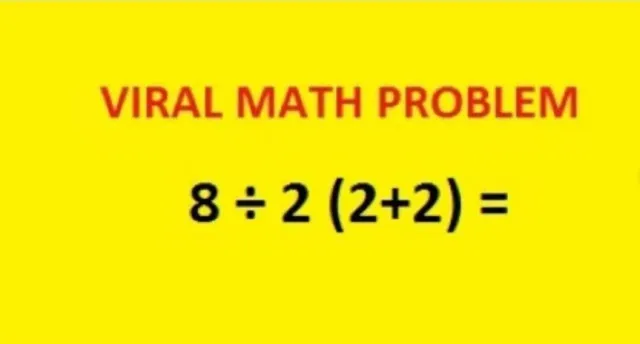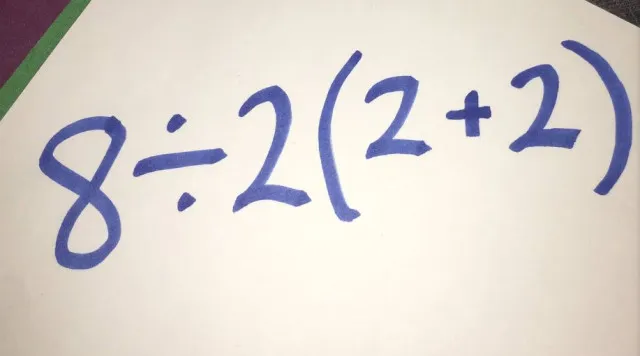Many adults find it hard to solve this simple math problem meant for kids. Practicing basic math skills can help overcome this challenge.
As adults, we often assume that our mathematical skills have improved since our childhood.
However, a recent viral math problem has proven that even grown-ups can struggle with seemingly simple equations.

A math problem for kids often divides opinions on the correct answer.
The problem in question is as follows:
8 ÷ 2(2+2)
Some individuals claim the answer is 16, while others insist it is 1.

How can a math problem have two correct answers?
The answer lies in the way the equation is interpreted and solved.
The key to solving this problem is to remember the order of operations, often referred to as PEMDAS (Parentheses, Exponents, Multiplication and Division, Addition and Subtraction).
We also have another one, called BODMAS (Brackets, Orders, Division and Multiplication, Addition, and Subtraction).
This sequence dictates the order in which the operations should be performed.
In the given equation, the first step is to solve what’s inside the parentheses: 2+2 = 4.

The equation now looks like this: 8 ÷ 2(4).
The next step is to interpret the meaning of 2(4).
Some may assume that this is simply multiplication, leading to the answer of 8 ÷ 8 = 1.
What is the correct answer?
For this question, start by solving inside the brackets: (2+2) = 4.
This changes the equation to 8 ÷ 2 (4). Since a number next to a bracket indicates multiplication, the equation now becomes 8 ÷ 2 × 4.
Therefore, the equation should be solved as follows:
8 ÷ 2 x 4 = 4 x 4 = 16
This is the correct answer according to the order of operations.

Noteworthy, some calculators may give a different result if the equation is entered without proper parentheses.
As a result, it can lead to the incorrect answer of 1.
Social media reaction
On social media, people shared their various answers to this math problem.
The answer is 16, and with these answers of 1, it’s no wonder society is doomed! One user said.
16, when division and multiplication are part of the expression, the RULE is to do whichever comes first left to right, the second user explained.
Both 16 and 1 could be the right answers but normally multiplication comes before division so I would prefer 1 as an answer, the third user commented.
Should be no debate. Using PEMDAS, answer should be 16, another wrote.
The correct result is:1, someone insisted.
Understanding the order of operations in Math
This math problem mainly indicates the importance of understanding and applying the order of operations, even as adults.
It’s a skill that can easily be overlooked, but it remains a crucial aspect of problem-solving in mathematics.

To understand this better, review the order of operations and practice different math problems.
This will help you solve even the hardest equations with confidence.
Many adults find this basic math problem confusing, but practicing can make it easier.
The importance of mastering mathematical rules
Importantly, mathematics is not just about getting the right answer.
It’s about understanding the underlying principles and applying them correctly.
Mastering the order of operations equips people to handle mathematical challenges better.